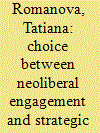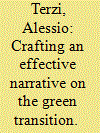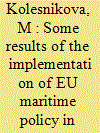|
|
|
Sort Order |
|
|
|
Items / Page
|
|
|
|
|
|
|
| Srl | Item |
| 1 |
ID:
136246


|
|
|
|
|
| Summary/Abstract |
The UK׳s housing stock generates approximately 27% of the country׳s total annual carbon emissions. In light of the legally binding targets to reduce carbon emissions, new housing is subject to a tightening of regulations governing energy demand and efficiency resulting in a gradual improvement in carbon emissions. The question is how to achieve the deep carbon emission reductions from existing domestic properties, of which 75% will still be in use in 2050. Government has sought to provide incentives to homeowners to improve the energy efficiency of their households, and mandate improvements in socially rented housing using a range of fiscal measures, most recently the ‘Green Deal’. There has however been little consideration of the 18% of UK households who privately rent their home, a tenure that is growing fast. The aim of this research is to investigate the factors that influence private sector landlords when considering energy efficiency improvements to their tenanted homes. The results indicate that government policy has consistently failed to engage private sector landlords in the issue of energy efficiency and thus measures must be taken to understand the motivations of landlords in order to design effective incentives and interventions.
|
|
|
|
|
|
|
|
|
|
|
|
|
|
|
|
| 2 |
ID:
115635


|
|
|
|
|
| Publication |
2012.
|
| Summary/Abstract |
Energy efficiency and social programmes have failed to stem the dramatic increase in the number of fuel poor households in recent years. As the 2016 deadline for eradicating fuel poverty nears, energy efficiency and fuel poverty programmes are undergoing significant changes. The ambitions for Britain's Green Deal, the overhaul of supplier obligations alongside the winding down of Warm Front, and the introduction of an incentive for renewable heat combine to form a sea change in how energy efficiency and fuel poverty objectives are financed and delivered. Green Deal Finance (GDF) eliminates the up-front capital cost of energy efficiency measures to the household by linking repayments to energy savings and spreading them over many years. This paper asks whether and how GDF could be beneficial to fuel poor households. Using scenarios modelled on the English House Condition Survey, it explores the extent to which fuel poverty could be reduced, allowing for repayments incurred by GDF. It examines how much further fuel poverty could be alleviated were the capital cost subsidised or repayments supported, and concludes that a flexible design for GDF is necessary if it is to contribute to alleviating fuel poverty.
|
|
|
|
|
|
|
|
|
|
|
|
|
|
|
|
| 3 |
ID:
188564


|
|
|
|
|
| Summary/Abstract |
This article explores the dynamic coexistence of neoliberal and realist narratives in the EU's discourse on international green cooperation with a focus on Russia. Using critical discourse analysis and critical geopolitics, the article explores how the neoliberal and realist narratives were applied in the EU's international (Russia-focused) energy transition cooperation. The neoliberal narrative presupposed fine-tuned multilateralism and market openness, with an opportunity for Russia to join the EU's success story. The realist narrative was based on the notions of relative gains, strategic autonomy/sovereignty, market corrections by public authorities, borders and closed alliances, Russia was used in this narrative to encourage more EU autonomy and strategic partnerships. The article demonstrates how and why the geopolitical narrative was strengthened between 2020 and 2021. It reveals the similarities between the neoliberal and realist narratives regarding the policy framework and relative positions of the EU and Russia in the spacialisation of the green energy policy. As a result, no policy opening for selective engagement with Russia emerged; rather, the 2020–2021 discourse prepared the EU for a policy shift that it took to react to Russia's assault against Ukraine in February 2022.
|
|
|
|
|
|
|
|
|
|
|
|
|
|
|
|
| 4 |
ID:
177131


|
|
|
|
|
| Summary/Abstract |
The ambitious carbon-reduction targets set out by the Paris Agreement, or by recent Green Deals such as the one launched by European Commission President Ursula von der Leyen, will require a high degree of engagement with the public. This is true not only as important changes in lifestyle are going to be needed from citizens, especially in developed economies, but also because top-down measures will need public approval to be put in place. This paper reviews literature from behavioural and environmental economics, cognitive sciences, (social) psychology, health policy, and marketing to condense key insights on how to make communication on the green transition more effective in terms of citizens’ engagement. In doing so, it distils six policy recommendations that can serve as building blocks for an impactful narrative accompanying decarbonisation strategies, in Europe and beyond. If used skilfully, an effective communication and consequent behavioural change holds the promise of complementing top-down financial and regulatory tools, accelerating the green transition.
|
|
|
|
|
|
|
|
|
|
|
|
|
|
|
|
| 5 |
ID:
181061


|
|
|
|
|
| Summary/Abstract |
The European Union’s (EU) Green Deal gives increased attention to the sustainability of international product cycles by implementing ‘due diligence’ requirements. We examine the difficulties in the implementation of the European Union Timber Regulation (EUTR) in two countries with weak management capacities such as Romania and Ukraine. We find that domestic and transnational civil society actors can support the implementation of due diligence requirements mainly by challenging the dominant position of private and state actors engaged in cutting deals with the EU-based wood industry, as well as contributing to increasing politicisation, raising awareness and public mobilisation.
|
|
|
|
|
|
|
|
|
|
|
|
|
|
|
|
| 6 |
ID:
116715


|
|
|
|
|
| Publication |
2012.
|
| Summary/Abstract |
This paper reviews the thermal performance of the existing UK housing stock, the main fabric efficiency incentive schemes and the barriers to obtaining deep energy and CO2 savings throughout the stock. The UK faces a major challenge to improve the thermal performance of its existing housing stock. Millions of dwellings possess 'hard-to-treat' solid walls and have glazing which is not cost effective to improve. A range of fabric efficiency incentive schemes exist, but many do not target the full range of private and social housing. From now on, the Green Deal will be the UK's key energy efficiency policy. However, the scheme is forecasted to have low consumer appeal and low incentives for investors. Moreover, calculated Green Deal loan repayments will be reliant upon estimated energy savings, yet it is claimed that retrofit measures may only be half as effective as anticipated due to a lack of monitoring, poor quality installation and the increased use of heating following refurbishment. Looking to Germany, there has been success through the Passivhaus standard, but the UK currently lacks appropriate skills and cost effective components to replicate this approach. In addition, the embodied energy in retrofit products and materials threatens to counter operational savings.
|
|
|
|
|
|
|
|
|
|
|
|
|
|
|
|
| 7 |
ID:
150034


|
|
|
|
|
| Summary/Abstract |
The Green Deal (GD) was launched in 2013 by the UK Government as a market-led scheme to encourage uptake of energy efficiency measures in the UK and create green sector jobs. The scheme closed in July 2015 after 30 months due to government concerns over low uptake and industry standards but additional factors potentially contributed to its failure such as poor scheme design and lack of understanding of the customer and supply chain journey. We explore the role of key delivery agents of GD services, specifically SMEs, and we use the LoCal-Net project as a case study to examine the use of networks to identify and reduce barriers to SME market engagement. We find that SMEs experienced multiple barriers to interaction with the GD such as lack of access to information, training, and confusion over delivery of the scheme but benefited from interaction with the network to access information, improve understanding of the scheme, increasing networking opportunities and forming new business models and partnerships to reduce risk. The importance of SMEs as delivery agents and their role in the design of market-led schemes such as the GD are discussed with recommendations for improving SME engagement in green sector initiatives.
|
|
|
|
|
|
|
|
|
|
|
|
|
|
|
|
| 8 |
ID:
184022


|
|
|
|
|
| Summary/Abstract |
THE EUROPEAN UNION is actively involved in developing the world ocean. Today, it positions itself not only as a consumer of "ocean resources," but also as a leader of sustainable development and a "global actor" playing an independent role in shaping the system of international ocean governance [1]. The EU's strategic maritime interests are multidimensional and primarily associated with ensuring its security [2:1, 2]. Its maritime interests lie at the junction of overlapping areas of activity, including political, economic, functional, sectoral, spatial, and administrative. Therefore, the implementation of its Maritime Policy is of particular importance to the EU.
|
|
|
|
|
|
|
|
|
|
|
|
|
|
|
|
|
|
|
|
|